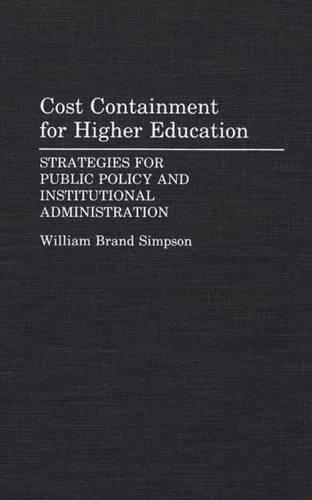
Cost Containment for Higher Education: Strategies for Public Policy and Institutional Administration
(Hardback)
Publishing Details
Cost Containment for Higher Education: Strategies for Public Policy and Institutional Administration
By (Author) William B. Simpson
Bloomsbury Publishing PLC
Praeger Publishers Inc
30th November 1991
United States
Classifications
Tertiary Education
Non Fiction
Environmental management
Cost accounting
379.118
Physical Properties
Hardback
272
Description
Simpson identifies strategies for cost containment or cost reduction in higher education and discusses these strategies in light of their effect on the quality of the learning experience, the future of the academic profession, and the implications for society. This differs from most of the current literature on cost, which tends only to describe it, explain factors underlying its increase, and with how it may be financed. Particular concern is given to options that could be followed over the long term without impairing the quality of educational opportunities, the academic profession, or society in general. The emphasis is thus on the objectives to be served, rather than the resolution of financial difficulties on the revenue side or on crisis management. Some of the strategies discussed are applicable at particular levels of government; some relate to interinstitutional arrangements; and some are options for individual institutions.
Reviews
Cost Containment is a summative work about public and institutional financial and academic policy with which every official connected with higher education should be familiar....In sum, this is a valuable and unique book, a reference tool for the current and next generation of academic and financial analysts and higher education policy makers. Although the book is devoid of the mathematical arcana of economics, it is densely packed with ideas and information to the point that it is much like an advanced but introductary textbook....It should serve higher education well into the next century.-Journal of Higher Education
It resembles a conversation among informed, interested economists who each contribute spontaneosly to the theme in small bites and with solid knowledge of the relevant literature.-Change: The Magazine of Higher Learning
This abundantly referenced book addresses every imaginable strategy, factor, or consideration pertaining to higher education costs and their potential containment. It is an excellent reference source for any higher education professional who is exploring this complex subject....(It offers) both a comprehensive overview of this timely and important subject and a valuable tool for finding answers to fit a myriad of circumstances.-Academe
"It resembles a conversation among informed, interested economists who each contribute spontaneosly to the theme in small bites and with solid knowledge of the relevant literature."-Change: The Magazine of Higher Learning
"This abundantly referenced book addresses every imaginable strategy, factor, or consideration pertaining to higher education costs and their potential containment. It is an excellent reference source for any higher education professional who is exploring this complex subject....(It offers) both a comprehensive overview of this timely and important subject and a valuable tool for finding answers to fit a myriad of circumstances."-Academe
"Cost Containment is a summative work about public and institutional financial and academic policy with which every official connected with higher education should be familiar....In sum, this is a valuable and unique book, a reference tool for the current and next generation of academic and financial analysts and higher education policy makers. Although the book is devoid of the mathematical arcana of economics, it is densely packed with ideas and information to the point that it is much like an advanced but introductary textbook....It should serve higher education well into the next century."-Journal of Higher Education
Author Bio
WILLIAM BRAND SIMPSON is Emeritus Professor of Economics at California State University, Los Angeles. He has served as Executive Director of the Cowles Commission for Research in Economics at the University of Chicago, as Managing Editor and Co-Editor of Econometrica, and as State President and member of the National Council of the American Association of University Professors.
